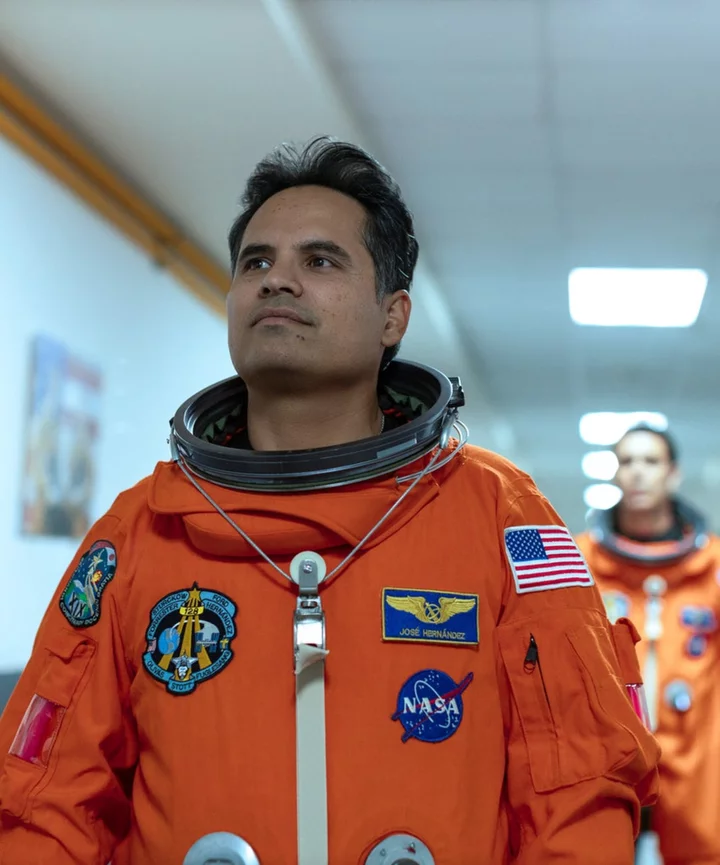José Hernández’s inspiring journey from migrant farmworker to NASA astronaut is already the subject of a 2012 autobiography. Now his story is the focus of a triumphant production directed and cowritten by Mexican director Alejandra Márquez Abella (Northern Skies over Empty Space; The Good Girls).
Starring Michael Peña as Hernández, A Million Miles Away is a heartwarming tale of heritage, drive, discrimination, and familial support. Spanning decades of his life, the movie explores Hernández’s determination and hard work to travel to space, a dream he chased since childhood. The film premieres on September 15, 2023 on Amazon Prime Video to celebrate the beginning of Latine Heritage Month, and it delivers a clear message: Always remember where you come from.
While Hernández was born in French Camp, California, the movie opens in Michoacán, Mexico, just before his family embarks on a working journey to pick food and make as much money as possible across the camps of the San Joaquin Valley. Migration is an essential character in A Million Miles Away. The film doesn’t shy away from showing the hardships of picking produce for the general U.S. population, demonstrating how migration and child labor — two circumstances that often arise from poverty and the need for money to survive — are incompatible with upward mobility and academic performance. Hernández’s tale feels extraordinary because of what he achieved, but it’s also an extremely ordinary story of social exclusion that affects millions of agricultural workers across the country.
“Hernández’s tale feels extraordinary because of what he achieved, but it’s also an extremely ordinary story of social exclusion that affects millions of agricultural workers across the country.”
nicole froioAccording to the National Center for Farmworker Health, there are approximately 2.9 million agricultural workers in the United States who serve as the backbone of the trillion-dollar agricultural industry. As such, Hernández’s story is a reflection of many Latine people: Around 63% of these farmworkers are Mexicans who crossed the border into the U.S..; 20% of them come from Michoacán.
For director Márquez Abella, whose previous projects centered on villainous characters, to take on the story of someone like Hernández was a challenge, as it required a tonal change for her as a scriptwriter and director.
“What attracted me to his story, first of all, was that it was an astronaut film. That was exciting,” Márquez Abella tells Refinery29 Somos. “And I think José’s story is just super appealing; you can’t escape it. It has many, many doors. And I was super emotional when I [first] knew about it. I’m used to making films about despicable characters, and this was a new challenge to talk about someone who’s so admirable and such a hero.”
Hernández spent his childhood in the fields of Michoacán, Mexico, and Stockton, California, learning English at the age of 12. He always dreamed of traveling to space, giving a new meaning to the idea of migration. However, some were skeptical of his goals to become an astronaut.
As soon as he could, he started applying to the NASA space program. He received 11 rejections before he finally became a crew member of Space Shuttle mission STS-128. Rejection after rejection might have kept others from applying, but his ability to brush himself off is a testament to his perseverance.
Much like Hernández in the film, Márquez Abella is also making history and traversing borders with the biopic: A Million Miles Away is her English-language debut. As a Mexican who has observed the effects of migration, Márquez Abella doesn’t believe there can be a balance between the depiction of the American dream — something that perpetuates pressures for Latine people to work hard no matter what — and the very real struggles of farmworkers. To overcome this, the director emphasized the importance of Hernández’s roots and how they helped him reach his goal.
“To me, it was important to praise the work that many, many people do on the fields,” she explains. “The idea that they put food on everyone’s table, and people don’t give enough thanks for that. I didn’t want to send a message that he got to do everything that he got to do despite being a migrant farm worker. It was because he was a migrant farmworker that he had the tools — ethically, mentally, physically — to become who he became.”
That’s why there’s a focus on Hernández’s determination, something that resonated with Márquez Abella. The director takes credit for one of my favorite lines in the film: “Tenacity is a superpower.” This is a line that comes from the time Márquez Abella spent with Hernández as she conducted research for the film. From him, she learned that what you need is already inside you, no matter what society tells you.
“I didn’t want to send a message that he got to do everything that he got to do despite being a migrant farm worker. It was because he was a migrant farmworker that he had the tools — ethically, mentally, physically — to become who he became.”
Alejandra Márquez Abella“I love it when the cousin tells [José], ‘Who is better than a migrant to dare leave this planet?’” Márquez Abella says. “And that to me has been the center of everything and what José has taught me. It’s not about always thinking about what you’re lacking and the distance between you and what you want to achieve; you already have it in you. In my case, I grew up watching directors who don’t look like me. It’s not just the color of the skin, it’s also the gender. And I’m not the right gender so that was an encouraging lesson. And then I think, ‘Of course, you need a lot of tenacity to get things done,’ you know?”
The feature film makes it abundantly clear that the support of his family — especially that of his wife Adela — was necessary to his success. Though the movie focuses on Hernández, it also tackles the familial sacrifice that allowed him, a working-class migrant, to achieve something of this magnitude. By highlighting the contributions of Adela, played by the electric Rosa Salazar, Márquez Abella was able to bring the female gaze into the production to convey that it often takes a village to get our people to the front.
“The American dream, as we know it, is an individual achievement, but Adela’s character defies this idea.”
nicole froio“I’m a feminist, and I wanted to bring some female gaze to the film,” the director says. “And I think that has to do with broadening the vision of how an experience is shown. And I thought that it was a big thing to show Adela doing everything that she did, even if it seems non-heroic. That was an important thing for me, and I think it comes across.”
The American dream, as we know it, is an individual achievement, but Adela’s character defies this idea. Hernández’s goal required that Adela and their kids give up a lot in their day-to-day lives — training to be an astronaut is, after all, a full-time job that cut into the time he had to help with the housework, for example — and the film exalts those sacrifices. Additionally, Adela has to cope with the possibility that something might go terribly wrong during the launch, which would effectively turn her into a single mother.
“José’s achievement is totalmente also Adela’s achievement,” Márquez Abella adds. “I wanted to take that idea into the visuals of the film. That’s why we cut to her in very important moments. Like, we are with him while he’s flying [the] plane, but then we cut to her, and she’s taking out the trash. There’s nothing more heroic than taking out the trash.”
“I hope people understand that praising your origins is important, and you have everything you need within yourself.”
ALEJANDRA MÁRQUEZ ABELLAUltimately, Márquez Abella wants moviegoers to understand that A Million Miles Away is about being proud of your roots, even when it goes against what society tries to teach you.
“I hope people understand that praising your origins is important, and you have everything you need within yourself,” Márquez Abella says. “You just need a little bit of tenacity to push things through, but I think that’s it. People make you think that you have to fit in, that you have to be someone else in order to be a part of the world, and I think that’s the wrong idea.”









